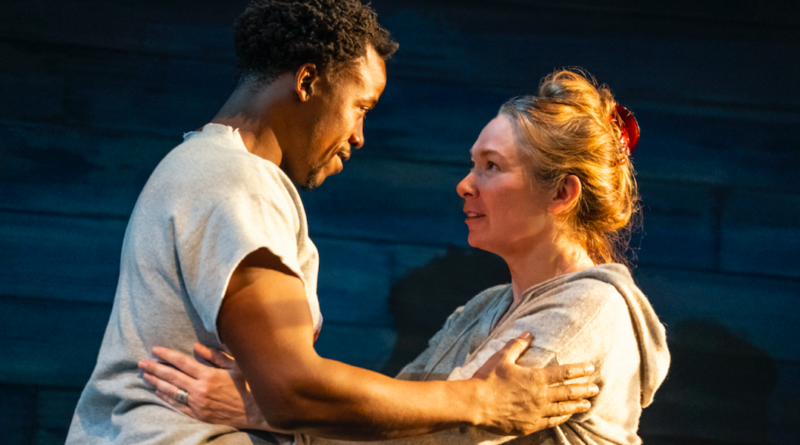REVIEW: ‘Long Day’s Journey Into Night’ from Audible Theater
Photo: Jason Bowen and Elizabeth Marvel star in Long Day’s Journey Into Night. Photo courtesy of Joan Marcus / Provided by BBB with permission.
NEW YORK — Eugene O’Neill’s classic play Long Day’s Journey Into Night, one of his most autobiographical works, has been given a stirring, exquisitely acted revival by director Robert O’Hara and actors Ato Blankson-Wood, Jason Bowen, Bill Camp and Elizabeth Marvel. This trimmed-down version runs two hours without an intermission and is part of Audible Theater’s ongoing residency at the Minetta Lane Theatre in the West Village.
The play deals with a family slowly coming undone. At first, James Tyrone (Camp) and Mary Cavan Tyrone (Marvel) seem like a couple with a well-off life and no worries in the world. She is seen performing yoga stretches, while he comes home from an early-morning coffee run. Their surroundings are a chic waterside house where the waves can always be heard in the background. Eventually first impressions fall away, and the raw reality of the Tyrone family’s struggles are laid to bear.
For starters, this Long Day’s Journey Into Night is not a historical tale stuck in the amber of O’Neill’s memories. It’s meant to take place right now, during the COVID-19 pandemic, with the Tyrone family members sometimes wearing masks and CNN newscasts about Donald Trump playing in the periphery. The furniture of the household is accented by Amazon boxes and FedEx packages.
When the Tyrones’ two sons enter the picture — Edmund (Blankson-Wood) and James Jr. (Bowen) — the pain and even misery of this quartet become evident. Edmund, for example, is coughing nonstop, clearly suffering from an illness, which his family sometimes acknowledges and sometimes passes over. The fact that the COVID-19 references are so obvious makes Edmund’s health crisis that much more potent.
There’s also the matter of Mary’s drug addiction. In some stagings of this classic play, her use of narcotics takes place off-stage, and the audience is meant to piece together her downfall. Not so with O’Hara’s version, which has Mary ascend the house’s stairs, sit down at a little desk, find the vein in her left arm and insert the syringe — and this process is repeated several times. It also becomes clear that James cannot hold his drink, and with his sons, the whiskey bottles are quickly dispensed.
The beauty and sorrow of the play is that sickness, of many different varieties, is clearly impacting the Tyrone family, yet there is a yearning to escape its stranglehold. On occasion they want to discuss the reality of their current status, but more often than not they want to gloss over the elephant in the room and think of better days. Eventually the sickness, from the drinking to the drug use, hinders their ability to fondly look backward at their collective past, and it becomes obvious that their future is mostly uncertain and potentially headed for disaster.
Blankson-Wood, who last appeared on Broadway in Slave Play, is a wonderful addition to the cast. He is visibly ill with coughing fits and constantly reminded of “doctor’s orders,” but he wants to be part of this family, to better understand his parents and his brother. Camp is a theater treasure and brings a lot of energy and candor to his portrayal of the father figure.
Bowen has an interesting part, and he plays it well. In many ways, James Jr. is meant to emulate the career of his father, who at one point was a successful theater actor, but in many ways he heads down the similar pathway of James Sr., drinking too much and never plotting a journey for the future.
Marvel is the best of the bunch, and that’s both because of how O’Neill wrote the Mary character and how simply wondrous Marvel’s acting ability is. Over the course of this long day she starts off with a positive outlook and hope for the hours ahead. But as the morning bleeds into the late-afternoon twilight, and then evening descends, she follows the path of the sun into despair and drug use. By the end, her arc is the most profound and saddening, her dialogue literally turning into incomprehensible recitations.
The Tyrone family has come undone.
O’Hara, whose credits include Broadway’s Slave Play, has created a gut-wrenchingly realistic, personal and painful revival of O’Neill’s masterpiece. He has convincingly and appropriately updated the text, captured the fine performances of the exquisite cast, and allowed the audience the chance to see this classic tale play out in contemporary times. This one is a winner.
By John Soltes / Publisher / John@HollywoodSoapbox.com
Long Day’s Journey Into Night, by Eugene O’Neill and directed by Robert O’Hara, continues at the Minetta Lane Theatre as part of the Audible Theater program. Starring Ato Blankson-Wood, Jason Bowen, Bill Camp and Elizabeth Marvel. Running time: 2 hours. Click here for more information and tickets.

